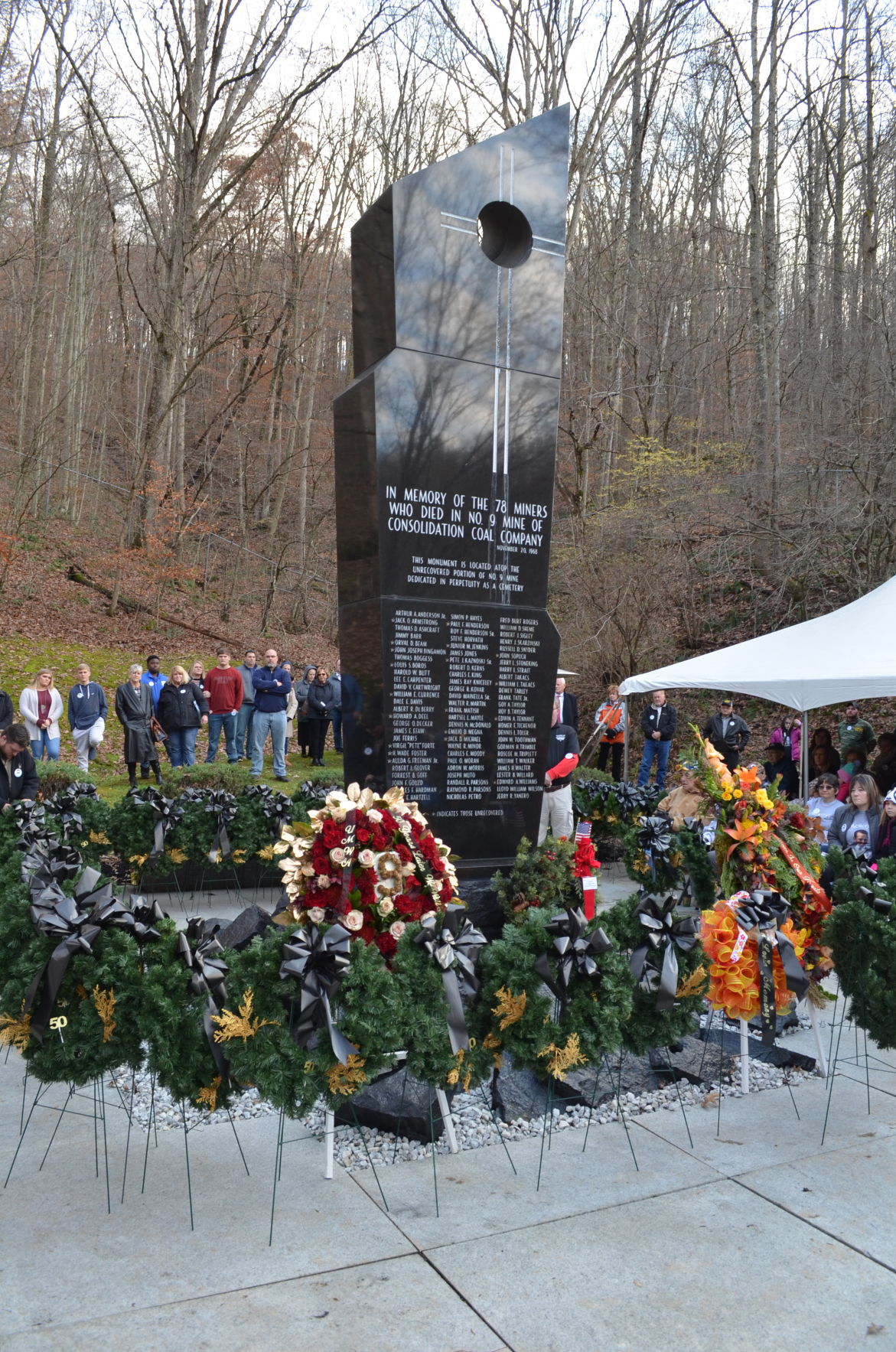West Virginia Supreme Court to Consider Two Questions in Farmington No. 9 Appeal

By Matt Harvey
February 20, 2019 - The West Virginia Supreme Court soon will consider a question — and perhaps two — that could decide whether the families of 78 miners killed in the 1968 Farmington No. 9 explosion can sue Consolidation Coal over a fraudulent concealment claim.
The questions come from the U.S. 4th Circuit Court of Appeals. It’s considering whether to overturn a decision by Senior U.S. District Judge Irene M. Keeley that dismissed the class action lawsuit.
The 4th Circuit, seated as Chief Judge Roger L. Gregory, and Judges Barbara Milano Keenan and Diana Gribbon Motz, sent the certified questions to the West Virginia Supreme Court. The U.S. appeals court judges haven’t found West Virginia authority that definitively answers the two questions.

The Farmington No. 9 Mine Memorial is adorbed with wreaths last November to honor those who died in the disaster.
Photo by John Mark Shaver
The case is set for arguments March 5, with the state Supreme Court seated at the WVU College of Law.
If the state Supreme Court answers yes to both of the questions, the Fourth Circuit might send the matter back to Keeley with orders to reinstate the case. The survivors of the 78 miners are seeking $110,000 for each miner — the amount for a wrongful death claim at the time of the explosion — plus punitive damages.
The first question to be considered by the state Supreme Court is basically this: If a wrongful death claim wasn’t timely filed, but it could have and probably would have been if there hadn’t been fraudulent concealment of facts, is the matter then ripe for jurisdiction in West Virginia courts?
The second question will only come into play if the justices answer yes to the first one.
For the miners’ families, the West Virginia justices would have to decide that the statute of limitations in a corporate case could be put on hold if a corporation concealed “both the intentional act and the identity of a particular employee, who allegedly acted at the direction of the entity, resulting in the death of other employees at the workplace.”
In the Farmington No. 9 lawsuit, it’s clear that the plaintiffs by 2008 knew of a report contending an alarm for a ventilation fan at the mine allegedly had been bypassed. And the plaintiffs also by 2009 had a copy of a fan recording charge that “allegedly had been removed from the mine shortly after the explosion, and had been altered purportedly in an attempt to conceal Consolidation Coal’s culpability in the explosion.”
It’s also clear that the plaintiffs didn’t learn of the name of the individual who intentionally disabled the system (the mine’s chief electrician) until June 9, 2014. The class action was filed later that year in Marion County. It alleged the chief electrician was “acting under the direction and control” of Consolidation Coal during the tampering with the ventilation fan alarm.
The class action later was moved to U.S. District Court, where Keeley ruled West Virginia hasn’t recognized a wrongful death fraudulent concealment claim. She also found that even if such a fraudulent concealment claim in a wrongful death case would be in the jurisdiction of West Virginia courts, the plaintiffs in this matter still didn’t meet the statute of limitations. Keeley pointed to 2008, when the plaintiffs first learned the ventilation fan system had been disabled.
Lawyers for the class action brought on behalf of the miners are Timothy Bailey and Scott Segal of Charleston, Paul Estep of Kingwood, and Mark Barney of Hurricane.
They contend “fraudulent concealment is hiding facts to deprive a person of some right or property. For nearly (46) years, the petitioners have sought to find out who was responsible for the deaths of their loved ones. While justice delayed is justice denied, closing the courthouse doors due to fraudulent concealment is no justice at all,” they wrote in their brief to the high court.
They added later that “West Virginia public policy does not support fraud. Most certainly, it does not support fraud which conceals the identify of management-level employees involved in the intentional exposure of 78 coal miners to unsafe conditions which resulted in their deaths in a horrific mine explosion and fire.”
The lawyers for Consolidation Coal Co. are Henry Jernigan and William Robinson of Charleston, and Alex Greenberg and Christopher Jones of Morgantown.
They note that this is the “fourth in a series of civil actions filed on behalf of the estates of those miners, the third of which was resolved in 1982.”
Also, “notwithstanding the Fourth Circuit’s reticence, the answers to (the two certified) questions are clear. The proposed fraudulent concealment theory advanced by petitioners is not viable in the context of a claim based on wrongful death,” they wrote. “Any conclusion to the contrary would effectively displace the (statutory) framework governing wrongful death claims.
“Moreover, as the District Court further held, even if petitioners’ fraudulent concealment theory were found to be viable, the two-year statute of limitation applicable to common law claims would nevertheless bar the prosecution of their case. Petitioners’ argument is but a further effort to contort established law for the sole purpose of avoiding the statutory bar,” they wrote.
The state Supreme Court is scheduled to begin hearing arguments at 10 a.m. March 5. This case is the third and final one to be argued, with Justice Margaret L. Workman disqualified and to be replaced for this case by Circuit Judge H. Charles Carl III of Hampshire, Hardy and Pendleton counties.

